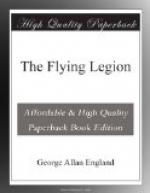“I will tell thee of but one thing, Abu Shawarib,” (father of whiskers) answered Rrisa with pride. “Old Abd el Rahman is our prisoner in the flying ship above. We are taking him back to Mecca. All his people of the Beni Harb lie dead far toward the great waters, on the edge of the desert of the sea. The Great Pearl Star we also have. That too returneth to the Haram. Allah iselmak!” (Thanks be to Allah!)
The naib prostrated himself, with joyful cries, and touched lips and forehead with quivering fingers. All others who heard the news, did likewise. Fruits, pomegranate, syrup, honey, and jild el faras[1] were brought as offerings of gratitude. The crew ascended to the air-liner amid wild shouts of praise and jubilation.
[Footnote 1: Literally “mare’s skin.” Apricot paste in dried sheets, cut into convenient sizes. A great dainty among the Arabs.]
“You see, Leclair?” the Master inquired, as Nissr drew away once more to eastward, leaving the village in the palms behind. “We hold power already with the sons of Islam! What will it be when—?”
“When you attempt to take from them their all, instead of returning to them what they so eagerly desire to have!” the Frenchman put in. “Let us hope all for the best, my Captain, but let us keep our powder very dry!”
Two days and one night of steady flying over the ocean of sand, with but an occasional oasis or caravan to break the appalling wastes of emptiness, brought Nissr to the Valley of the Nile. The river of hoar antiquity came to view in a quivering heat-haze, far to eastward. In anticipation of possible attack, Nissr was forced to her best altitude, of now forty-seven hundred feet, all gun-stations were manned and the engines were driven to their limit. The hour was anxious; but the Legion passed the river in safety, just a little south of the twentieth degree, near the Third Cataract. Bohannan’s gloomy forebodings proved groundless.
The Red Sea and Arabia were now close at hand. Tension increased. Rrisa thrilled with a malicious joy. He went to the door of the captive Sheik, and in flowery Arabic informed him the hour of reckoning was at last drawing very near.
“Thou carrion!” he exclaimed. “Soon shalt thou be in the hands of the Faithful. Soon shall Allah make thy countenance cold, O offspring of a one-eyed man!”
Three hours after, the air-liner sighted a dim blue line that marked the Red Sea. The Master pointed at this, with a strange smile.
“Once we pass that sea,” he commented, “our goal is close. The hour of great things is almost at hand!”
“Provided we get some petrol,” put in Bohannan.
“Faith, an open gate, that should have been closed, defeated Napoleon. A few hundred gallons of gasoline—”
“The gasoline is already in sight, Major,” smiled the chief, his glasses on the coastline. “That caravan—see there?—comes very apropos.”




